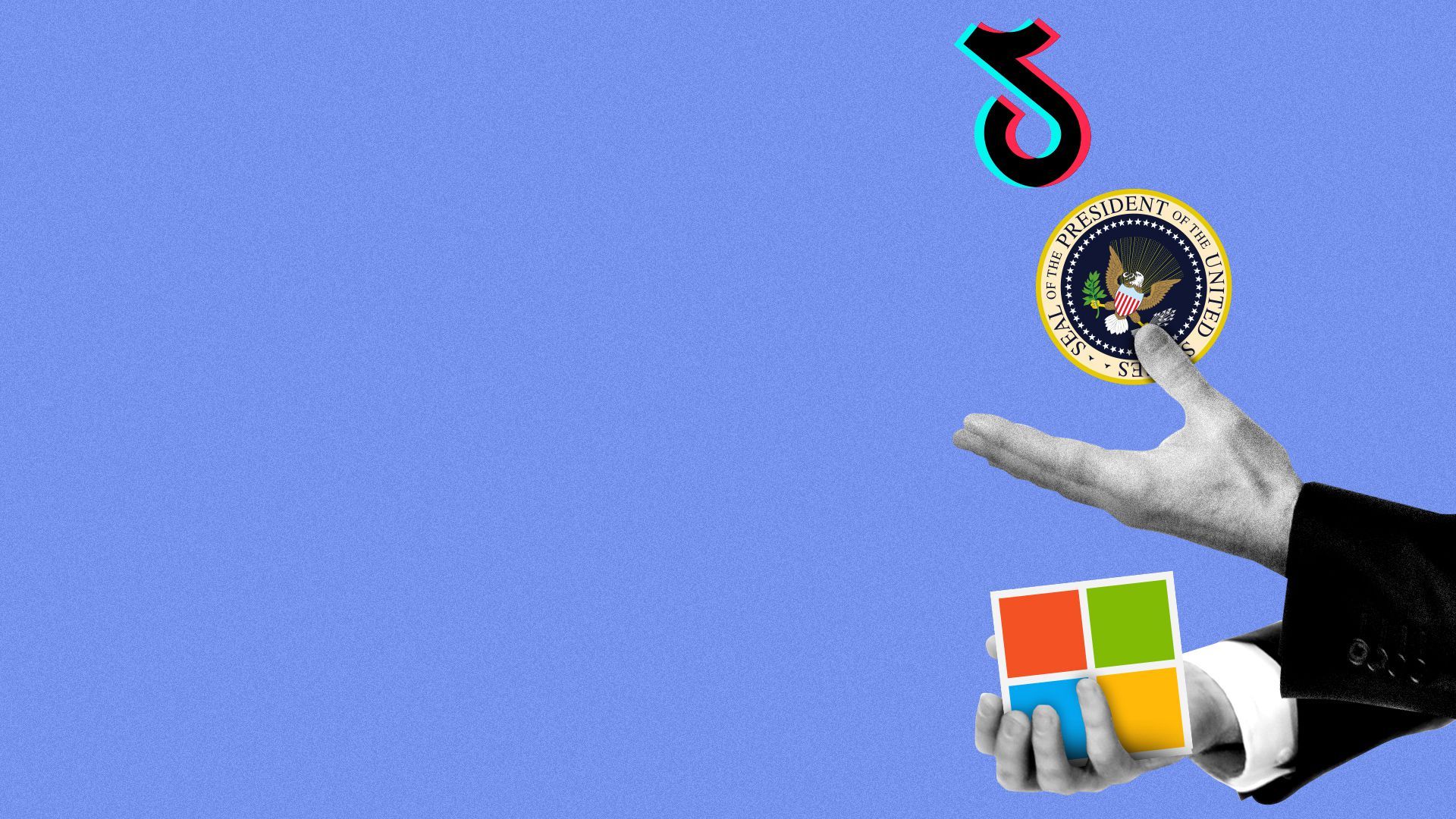Trump's TikTok and WeChat actions ratchet up the pressure on China
Add Axios as your preferred source to
see more of our stories on Google.

Illustration: Aïda Amer/Axios
President Trump escalated his campaign to claw apart the Chinese and American tech worlds Thursday evening, issuing executive orders that threaten to ban both TikTok and massive global messaging app WeChat.
The big picture: Trump's orders come against a backdrop of heightening tension with China, the steady unfolding of a hard "decoupling" between the world's two largest economies, and the Trump campaign's effort to wave a "tough on China" banner.
Driving the news: Trump seeks to bar Americans from transacting in any way with TikTok or WeChat starting 45 days from the signing of the orders.
- That's effectively a shot clock for Microsoft or other U.S.-based suitors to try to close a deal to acquire TikTok and adds legal weight to Trump's threat to ban the social video app if a deal that fully severs any Chinese ties isn't reached.
- Trump now appears to be doing something similar for WeChat, owned by Chinese tech giant Tencent. A White House official told the L.A. Times the order doesn't apply to Tencent's other American holdings. (Tencent invests widely in tech companies like Reddit, Spotify and Fortnite publisher Epic Games, and is the full owner of League of Legends maker Riot Games.)
Yes, but: WeChat is not only huge inside China but serves to connect users there with friends and family abroad, and shutting it down in the U.S. would be a major disruption to the Chinese diaspora. Beijing's internet surveillance and censorship means most Chinese communication platforms stay domestic, and American tech platforms don't extend into the country.
- Unlike TikTok, which doesn't operate in China, WeChat can't be cleanly severed from China, so there's no path to a domestic acquisition, and the executive order likely amounts to a ban.
- And if American companies can't do any commerce involving WeChat, which is widely used for a vast range of functions within China, that could demolish the Chinese business of companies like Apple, observers note.
Details: Trump's edicts cite "emergency powers" as the basis for the unusual order targeting individual foreign companies.
- Both orders say the apps' "data collection threatens to allow the Chinese Communist Party access to Americans' personal and proprietary information," in the case of TikTok "potentially allowing China to track the locations of Federal employees and contractors, build dossiers of personal information for blackmail, and conduct corporate espionage."
- TikTok has long said that it stores all data belonging to U.S. customers in facilities outside of China that are not subject to Chinese law.
Between the lines: The emergency powers Trump is invoking have been used in the past to block assets of hostile foreign powers or to target terrorist organizations after 9/11.
- Security experts have raised real concerns over the prospect of TikTok exposing U.S. users' data to Chinese authorities, but as even the president's order concedes, this is a "potential" threat, not an imminent danger.
- Some observers believe that the urgency of the president's deadline is largely about pressuring TikTok parent ByteDance to make a deal fast. The firm could sue to challenge the order, but courts move much slower.
Of note: Nowhere does the executive order mention Trump's outlandish suggestion that the U.S. Treasury should get a cut of any deal between TikTok and a U.S. acquirer.
Meanwhile: The orders come the same week that the State Department debuted the "Clean Network" initiative, which marshals under one umbrella a set of initiatives to edge out Chinese tech, including the push against Chinese apps.
What's next: TikTok's secret sauce is its hugely popular and effective machine-learning-based recommendation algorithm. One question for any potential acquirer will be whether that key system comes with any deal.
- Tencent and WeChat's 1.2 billion users around the world for now just face massive uncertainty.
- Also next: China is almost certain to retaliate in some way against U.S. companies.

